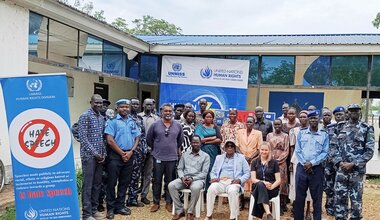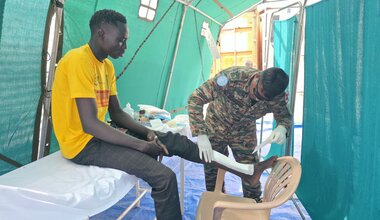Resolutions of peace made at Kapoeta trust building meeting attended by UNMISS chief
“The leadership of South Sudan needs to remember that the people of South Sudan want peace. This is evidenced by this meeting and many like it across the country that I have witnessed,” stated David Shearer, the Head of the United Nations Mission in South Sudan.
He did so at a local rapprochement and dissemination of the peace agreement meeting held in Kapoeta in Eastern Equatoria, where over 100 stakeholders met to discuss how to anchor the peace process.
“You must compromise to bring peace. But you need to make sacrifices to maintain it,” Isaac Moro, an official of the Joint Military Ceasefire Commission, advised those in attendance.
The one-day reconciliatory meeting, organized by the peacekeeping mission, focused on building trust and confidence between representatives of the government and the South Sudan People's Defence Forces, opposition forces, religious leaders and the civilian population.
“It is time to implement this peace deal to the letter. We will no longer turn a blind eye: any officer from our forces who disturbs the peace in the community will be arrested,” declared Youssif Peter, a high-ranking officer of the opposition forces.
The forum’s primary objectives included securing renewed commitment to the peace agreement from all commanders and community leaders and raising awareness of some of its key provisions.
“We know the men have only been implementing this peace on paper. However, from today, we women will do it in practice,” said Laura John, speaking on behalf of her sisters.
The Reconstituted Joint Monitoring Evaluation Commission supported the event by providing participants with an Arabic audio version of selected provisions of the accord. Hitherto, the content of the peace deal has been commonly available only on paper, and mostly in English.
“I have come to the conclusion that people do not read it, so they go contrary to its provisions,” admitted Louis Lobong Lojore, the governor of Kapoeta.
Spells of rain did not interrupt the open-air gathering. Discussions continued throughout the day, resulting in the compilation and signing of recommendations to enhance cooperation between parties.
“Some 7,500 troops from Kapoeta need to be trained for the cantonment sites, but we must ensure these troops are representative of all five tribes here,” stressed Marko Lokidor Lochapio, the governor of Kapoeta on the side of opposition forces.
Participants agreed on several resolutions, including putting an end to the practice of uniformed personnel carrying weapons within communities. Another decision was to stop all forms of mobilizations and provocations by parties, including by means of inflammatory messages on social media platforms.
Michael Kong, a high-ranking member of the South Sudan People's Defence Forces, pointed out a few other issues needing urgent attention.
“This area currently has three governors, yet soldiers still live within the communities instead of in their barracks, and they continue to loot homes. We must resolve this confusion,” he said.
The day after the meeting, UN peacekeepers organized a cultural happening in the town centre, showcasing performances representing 16 different ethnic groups. The festivities were enjoyed by all stakeholders in a symbolic, public show of standing united and willing to work for durable peace.
 UN
UN United Nations Peacekeeping
United Nations Peacekeeping





